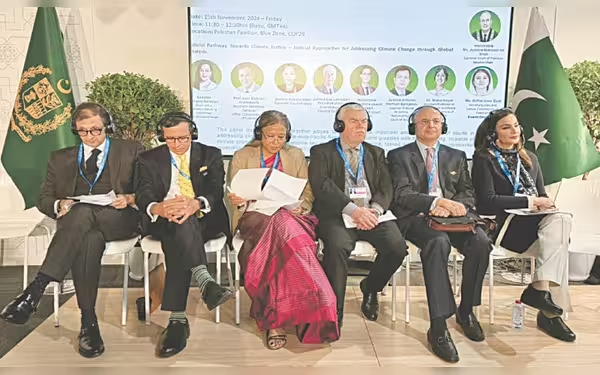Saturday, November 16, 2024 10:02 PM
Judicial Coalition of Vulnerable Countries Advocates for Climate Finance
- Judiciary's role in climate justice emphasized at COP29.
- Judges advocate for vulnerable communities' rights.
- Call for judicial coalition to push for climate finance.
 Image Credits: dawn
Image Credits: dawnJudges at COP29 call for a judicial coalition of vulnerable countries to advocate for climate finance and justice.
Climate change is one of the most pressing issues facing our planet today, and it disproportionately affects the most vulnerable countries, particularly those in the Global South. As the world grapples with rising temperatures, extreme weather events, and environmental degradation, the need for effective climate finance has never been more urgent. At the recent COP29 summit, a panel discussion held at the Pakistan Pavilion highlighted the crucial role of the judiciary in the fight for climate justice.
The session, titled “Judicial Pathways Towards Climate Justice: Judicial Approaches for Addressing Climate Change Through Global Analysis,” brought together esteemed judges and climate experts to discuss how judicial bodies can address the pressing environmental challenges intertwined with socioeconomic and developmental issues. Supreme Court judges Syed Mansoor Ali Shah and Ayesha Malik, along with Lahore High Court judge Jawwad Hassan and Senator Sherry Rehman, shared their insights on the matter.
During the discussion, the panel emphasized that the judiciary has a unique position to influence climate policy and ensure that the rights of vulnerable communities are protected. By interpreting laws in a way that prioritizes environmental sustainability, judges can help hold governments and corporations accountable for their actions that contribute to climate change. This is particularly important in countries where legal frameworks may not adequately address environmental concerns.
Moreover, the judges pointed out that climate justice is not just about protecting the environment; it is also about ensuring that marginalized communities have a voice in the decision-making processes that affect their lives. The panelists argued that a judicial coalition of the “most vulnerable countries” could be instrumental in advocating for climate finance and pushing for stronger international commitments to combat climate change.
As the world continues to face the consequences of climate change, the role of the judiciary becomes increasingly vital. By leveraging their authority, judges can help create a more equitable and sustainable future for all. The discussions at COP29 serve as a reminder that while the challenges are daunting, there is hope in the collective efforts of the judiciary and civil society to push for meaningful change.
The call for a judicial coalition among the most vulnerable countries is not just a plea for financial support; it is a call to action for justice and accountability. As we move forward, it is essential for all stakeholders, including governments, civil society, and the judiciary, to work together to ensure that climate finance reaches those who need it most. Only then can we hope to build a resilient future for our planet and its inhabitants.













